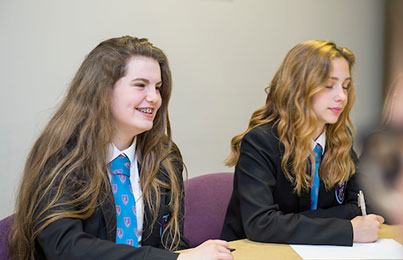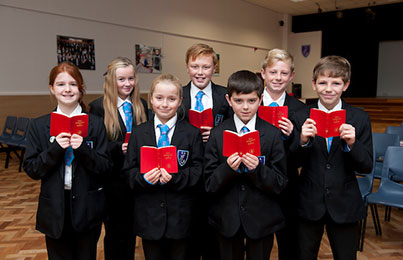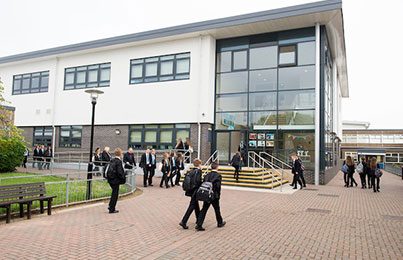Religious Education
- Religious Education
- Ethos & Values
- Knowledge & Skills
- Resources & Facilities
- Courses & Qualifications
- Learning Outside The Classroom
- Where Does This Take Me In The Future?
The R.E. curriculum area enables students to explore the teachings of different religions and world views, including Christianity, and to address fascinating key questions about the existence of God, the afterlife, authority, beliefs and values and the meaning, purpose and truth in life itself. Lessons help students to develop many important life skills and to develop their understanding of the people and the world in which we live. Through the careful and sensitive consideration of different cultures, belief systems, traditions and moral issues, students learn to understand and respect the similarities and differences that exist within local and global communities.
R.E. helps to develop successful and independent learners by posing life's greatest questions and giving all students the opportunity for self-reflection; to develop their own opinions and beliefs, to respond to contemporary moral and ethical issues, to challenge themselves and to ultimately understand more about themselves and others.
Religious Education is also a rigorous, academic subject, with consistently high expectations for student attainment. Furthermore, as the teaching of R.E. is always unbiased, there is a place for all pupils, of whichever faith or none, in Religious Education lessons.
Please explore these pages to find out more about what we offer.
Ethos & Values
We aim:
- To effectively deliver the Religious Education curriculum in a way that allows all students to enjoy and achieve.
- To raise attainment by creating a target-orientated culture based on the enhancement of self-esteem.
- To have consistently high expectations and match these with high quality resources and learning strategies.
- To contribute to the spiritual, moral, social and cultural development of students through the provision of a range of educational experiences appropriate to their age, ability and needs.
- To adopt a philosophy of continuous improvement in all aspects of the delivery of the Religious Education curriculum.
Knowledge & Skills
In their Religious Education lessons students will develop their knowledge and understanding of human behaviour and its consequences for other human beings, as well as developing a greater awareness of the world in which we live.
Religious Education not only develops subject specific knowledge as students learn about religions, it also promotes a wider range of skills and attributes, as students learn from religion. Examples of how students may benefit from their R.E. lessons are listed below:
- They can understand what motivates people, what they think and feel.
- They are able to read, interpret and evaluate different kinds of information, including text, maps, diagrams and symbols.
- They are able to look carefully at different sources of information and draw conclusions regarding how reliable they are.
- They are able to communicate clearly and effectively both verbally and on paper, displaying good levels of Literacy.
- They develop their understanding and awareness of spiritual, moral, social and cultural issues.
- They are able to weigh up evidence in order to formulate their own opinions and debate this with others who may have differing views
Resources & Facilities
- We have a number of dedicated, professional and fully qualified R.E. staff, who are passionate about teaching Religious Education and the contribution that it makes to the whole curriculum.
- Lessons are taught in well-equipped and comfortable classrooms, equipped with interactive facilities or a projector and a wide range of quality resources, ranging from excellent detailed textbooks and religious artefacts, to subject specific software.
- We also have access to ICT facilities which can be utilised by staff for lessons which require computer access.
Courses & Qualifications
Key Stage 3
All students have one period of Religious Studies in Key Stage 3 in accordance with the Locally Agreed Syllabus and National requirements. Lessons cover a broad range of themes including the environment, animal rights, rights and responsibilities and the nature of authority. The primary religion studied is Christianity, although due consideration is also given to each of the six main world religions and secular viewpoints.
Key Stage 4
GCSE RE is an optional qualification for students entering KS4. If they choose to study GCSE RE, students will follow the WJEC/Eduqas specification.
There is no coursework element to the GCSE course. It is assessed by three examinations.
Exam 1: Religious, philosophical and ethical studies in the modern world. This exam is 2 hours, and makes up 50% of the qualification. Students will answer questions on four key topics:
- Issues of relationships
- Issues of life and death
- Issues of good and evil
- Issues of human rights
Exam 2: Study of Christianity. This exam is 1 hour, and makes up 25% of the qualification. Students will answer questions on two key topics:
- Christianity: Beliefs and teachings
- Christianity: Practices
Exam 3: Study of Hinduism. This exam is 1 hour, and makes up 25% of the qualification. Students will answer questions on two key topics:
- Hinduism: Beliefs and teachings
- Hinduism: Practices
Students at KS4 will also receive their core RE curriculum during form time, on a weekly basis.
Learning Outside The Classroom
The R.E. Department understands the rich contribution that learning outside of the classroom can make to a student's education. The Department therefore strives to create enrichment opportunities for students, including a range of Key Stage 3 trips to experience religions in a tangible manner, for example cathedrals, Gurdwaras, stately homes and castles. The R.E. Department also provides a range of revision and support classes when required for Key Stage 4 students in order to help students achieve success in their exams. These are usually held at the end of the Academy day and are aimed at encouraging all students to fulfil their academic potential within the subject.
Where Does This Take Me In The Future?
- The study of Religious Education allows learners to develop a variety of invaluable and transferable skills which could lead to many different career choices. Some examples of careers that use skills developed in R.E. are:-
- Accountancy, Administration, Archaeology, Architecture, Barrister, Broadcasting, Civil Service, Diplomatic Service, Drama, Theatre and the Performing Arts, Education, Environment and Conservation, Finance, Information Management, Media, Teaching, Public Relations, Journalist, Legal Executive, Police, Politics, Publishing, Sales and Marketing, Solicitor, Tourism, Town Planning, TV Researchers, Social Work, Lawyers… to name just a few!
- Religious Education qualifications are accepted by almost all employers and universities as the wide range of skills and knowledge provided allows the student to develop as an individual. Most universities offer courses in Religious Studies, Philosophy and Theology for students who are interested in pursuing this subject at a higher level.





